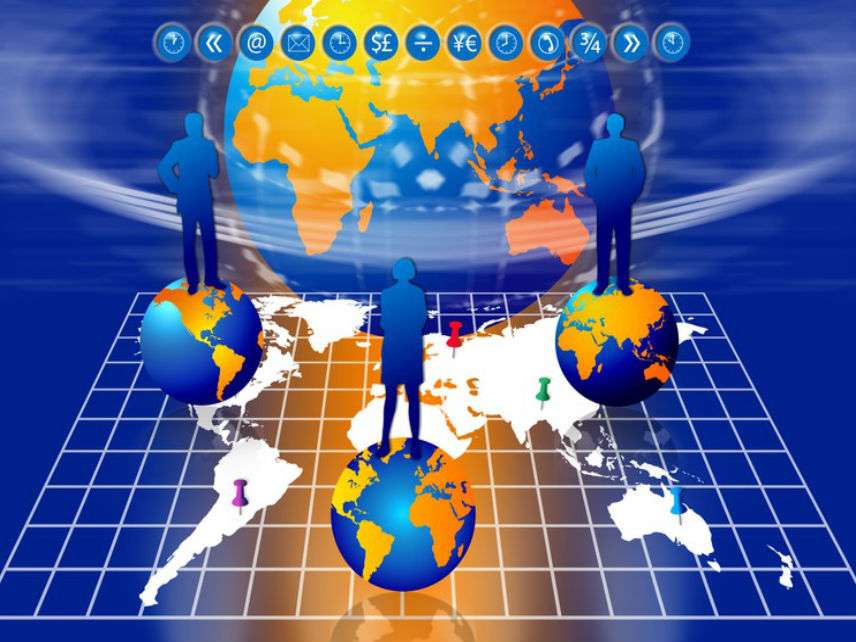Libertarian Globalism Versus Economic Nationalism
What Donald Trump and his posse of economic nationalists get wrong.

During a recent conversation with a long-time friend and founder of one of Washington, DC's leading free market think tanks, I mentioned in passing that as a libertarian I am a cosmopolitan globalist.
He had asked me what I thought of Donald Trump his administration and I told him that while I still had some hope he would roll back excessive federal regulation his anti-globalism was badly misguided and destructive.
My friend's response was vehement—not about Trump, but about the globalism. To be a globalist in his mind is the moral equivalent of a Marxist, countenancing elites conferring power on vast, unaccountable international bureaucracies, undercutting national sovereignty, and imposing uniform progressive policies to establish some sort of one-world government.
That is certainly not what I mean by globalism. To clear up this misunderstanding between two people working to expand the sphere of liberty, this is how I explain globalism.
Finding a coherent outline of Trumpian anti-globalism is diffcult, but Breitbart writer Virgil offers one description, "Trump's Nationalist Vision vs. the Gospel of Globalism." Virgil decries a "vision of a borderless world, with minimal restrictions on exports and imports. (And, of course, minimal restrictions on the transit, also, of people.)" The chief tenets of economic nationalism address concerns about the abridgement of sovereignty by "various murky transnational enterprises," the threat that immigrants pose to American jobs and culture, and the menace of international free trade.
Globalism, on the other hand implies globalization, or worldwide economic, financial, trade, and communications integration. Globalization opens local and national perspectives to an interconnected, interdependent world fueled by the free movement of capital, goods, labor, and services across national frontiers.
This outlook is quite congenial to proponents of individual liberty. "Political freedom and escape from tyranny demand that individuals not be unreasonably constrained by government in the crossing of political boundaries," the Libertarian Party platform asserts. "Economic freedom demands the unrestricted movement of human as well as financial capital across national borders."
My friend is clearly worried about the dangers to liberty posed by "murky transnational enterprises." He has a point. I have in the past warned about "policy laundering," when activists (and their allied bureaucrats and politicians) use treaties or other international agreements to impose rules, regulations, taxes, and mandates without domestic political support. This rationale amounts to "The treaty (or agreement) made me do it."
It is well to remember, however, that treaties between nation-states frequently have coordinated policies that enhance liberty. Although Trump has decried various trade treaties like NAFTA, such agreements have boosted economic growth and made most Americans better off.
Years of research provides overwhelming evidence that globalization is good for you. Cancelling NAFTA would not create more jobs for Americans, it would decimate them. "These trade agreements have left us freer," says Dan Griswold, the co-director of Mercatus' Program on the American Economy and Globalization, "And I think libertarians should support that."
Increasing international trade promotes peace. Evidence has mounted proving the aphorism, "when goods don't cross borders, soldiers will," often misattributed to 19th century French economist Frederic Bastiat, correct. The world has become less violent as capitalist peace has expanded. "When it's cheaper to buy things than to steal them, people don't steal them," explains Steven Pinker, author of The Better Angels of Our Nature: Why Violence Has Declined, "Also, if other people are more valuable to you alive than dead, you're less likely to kill them."
Economic nationalists are nativists. So Trump and other self-described economic nationalists want to dramatically cut legal immigration and deport millions of undocumented immigrants. Why? Because they claim immigrants disproportionately commit crimes and "steal jobs" from native-born Americans. Setting aside the libertarian principle that individuals have the right to go where they want unhindered by government, let's examine these assertions. It turns out that neither is right.
Numerous studies have found that crime rates for legal and undocumented immigrants are lower than native-borns. A 2016 report, The Integration of Immigrants into American Society, issued by the National Academy of Sciences (NAS), finds "cities and neighborhoods with greater concentrations of immigrants have much lower rates of crime and violence than do comparable nonimmigrant neighborhoods." The NAS also noted that "second generations are generally acquiring English and losing their ancestors' language at roughly the same rates as their historical predecessors, with English monolingualism usually occurring within three generations."
What about jobs? Research finds that states and localities that are more welcoming to immigrants have higher wages and rates of economic growth. Another study found that an increase in employment in a U.S. state of 1 percent due to immigrants produced an increase in income per worker of 0.5 percent in that state. A Cato Institute analysis in 2014 found that the impact of immigrants on federal, state and local budgets is basically a wash.
Libertarians, of course, resist any attempts to establish one world government controlled by shadowy elites. On the other hand, proponents of individual liberty oppose economic nationalists' efforts to restrict the freedom of people to trade, move, work, and live where they choose.
The good news is that libertarian globalism is not only the right thing to do on principle; defending liberty also has the salutary effect of increasing wealth, enriching culture, and promoting peace.


Show Comments (244)